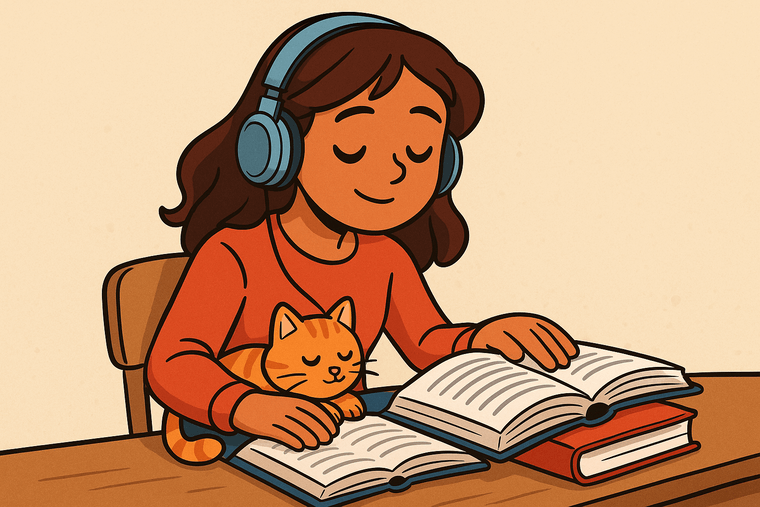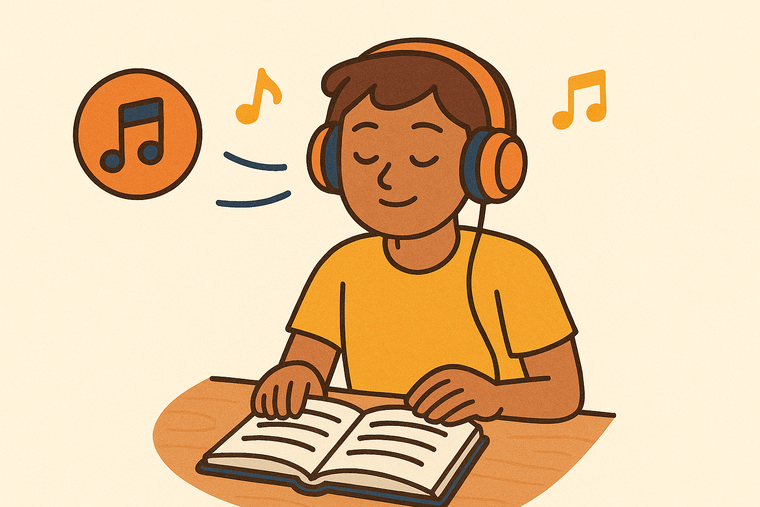How to Create the Ultimate Study Playlist: Community Insights That Actually Work
Discover proven strategies for creating the perfect study playlist based on real student experiences, from genre experimentation to productivity loops and innovative audio approaches.

TL;DR: Secrets to the Perfect Study Playlist
- Ditch Lyrics: Words compete for your brain's language processing power. Go instrumental.
- Match Energy: Use high-energy tracks for rote work, low-energy ambient for deep reading.
- Loop It: Listening to the same playlist creates a "Pavlovian" focus response over time.
- Game Soundtracks: Designed to keep you engaged but not distracted—perfect for long sessions.
That Moment When Music Transforms Your Study Session
Remember the last time you found the perfect song that somehow made those three hours of studying fly by? Or perhaps you're still searching for that magical playlist that keeps you focused instead of constantly skipping tracks. Whether you're a seasoned study music curator or someone who's tried everything from lo-fi beats to complete silence without success, our community has gathered insights that might just change your study game forever.
"I used to think study music was just background noise," shares Jamie, a medical student who discovered her perfect playlist formula during exam season. "But finding the right combination completely transformed my focus. It was like finally finding the right glasses prescription after years of squinting."
What Science and Fellow Students Tell Us About Study Music
Research suggests that music can significantly impact our study effectiveness—but what works is deeply personal. Our community members have discovered this firsthand.
"Classical music made me sleepy, but instrumental film scores kept me engaged without distraction," explains Carlos, a computer science major. "It took months of experimentation to discover that Hans Zimmer soundtracks put me in a 'coding zone' I couldn't achieve with anything else."
If you're wondering does classical music help with studying, you can dive deeper into the research and pros/cons in our full guide.
The science behind effective study music often comes down to a few key factors:
- Lyrics vs. Instrumental: Most (but not all) community members report better focus with lyric-free music
- Familiarity: Music you already know may distract less than new discoveries
- Tempo: Research suggests 60-70 BPM often works well for concentrated study
- Personal connection: The emotional response different genres trigger varies widely between individuals
But perhaps most importantly, what works for others might not work for you—and that's perfectly normal.
The Role of Consistency (2026 Update)
New behavioral research highlights that the content of your playlist matters less than the consistency of its use. Students who use a dedicated "Deep Work" playlist—and never listen to those specific songs during leisure time—build a neurological association. Over time, hitting "play" becomes a trigger that instantly lowers cognitive resistance to starting work.
Building Your Personalized Study Soundtrack: Community-Tested Approaches
The Genre Experiment Method
Michaela, who struggled with study music for years, shares her breakthrough approach: "I created 15-minute playlists from completely different genres—classical, ambient, jazz, even video game soundtracks. I studied with each for two days, rating my focus and retention. The results shocked me—video game music, specifically from strategy games, dramatically improved my performance."
Try creating your own genre experiment with these steps:
- Select 5-7 distinctly different types of music
- Create short playlists for each (15-30 minutes)
- Study similar material with each playlist
- Rate your focus, retention, and enjoyment
- Expand on what works, eliminate what doesn't
The Energy-Matching Technique
"My breakthrough came when I stopped using one playlist for everything," explains Aiden, who now mentors first-year students. "I realized different subjects and tasks needed different energy levels. Statistics requires precision and attention to detail, so I use minimal electronic music. For creative writing, atmospheric film scores help ideas flow."
Consider creating separate playlists for:
- Memorization tasks
- Problem-solving work
- Creative projects
- Reading comprehension
- Late-night sessions
- Morning review
The Productivity Loop System

Several community members independently discovered what Wei, a psychology graduate, calls "the productivity loop"—using music to create a consistent study ritual.
"I always play the same 30-second intro track before starting my main study playlist," Wei explains. "After months of this ritual, hearing that intro immediately puts my brain into study mode. It's like a productivity trigger that helps me overcome procrastination."
To create your own productivity loop:
- Choose a distinct song or sound that you'll only use for study sessions
- Play it at the beginning of every focused study period
- Follow immediately with your main study playlist
- Maintain consistency to strengthen the association
Beyond Playlists: Innovative Audio Approaches From Our Community
The Binaural Beat Experiment
"Traditional study music never worked for me until I discovered binaural beats," shares Priya, who struggled with ADHD. "Different frequencies seem to help with different types of studying. I use alpha waves (8-12 Hz) for creative work and gamma waves (30-50 Hz) for intense focus. The difference is remarkable."
While scientific evidence remains mixed, many community members report success with frequency-based audio. Consider:
- Alpha waves (8-12 Hz) for relaxed alertness
- Beta waves (12-30 Hz) for high concentration
- Theta waves (4-8 Hz) for deep focus and memory tasks
The Background Noise Revolution
Not everyone thrives with music. Taylor, who completed a double major, discovered an alternative approach: "Music of any kind distracted me, but complete silence made my thoughts too loud. My solution was coffee shop ambiance—just enough background noise to mask distractions without pulling my attention away."
Popular ambient noise options among our community:
- Coffee shop sounds
- Rainfall or thunderstorms
- Library atmospheres
- Soft white noise
- Nature sounds
Structuring Your Ultimate Playlist
Whether you're creating a study playlist from scratch or refining your current approach, community experience suggests these structural elements improve effectiveness:
The Focus Arc Method
"My playlists follow a deliberate arc," explains Zoe, who developed her system during law school. "They start with transition music to settle in, build to intense focus tracks, then gradually wind down to prevent burnout."
A well-structured study playlist might include:
- Transition songs (5-10 minutes): Slightly energetic music to shift your mindset toward studying
- Deep focus section (25-50 minutes): Your most concentration-enhancing tracks
- Brief break music (5 minutes): A distinctly different sound signaling break time
- Return to focus (25-50 minutes): Back to concentration music
The Time Block Technique
"I struggled with losing track of time until I built time awareness into my playlists," shares Marcus, who now helps freshmen develop study skills. "I include distinctive tracks at 25-minute intervals. When I hear them, I know it's time to assess my progress and take a short break if needed."
You can implement this by:
- Creating playlists with distinct "time marker" songs
- Using these auditory cues to maintain pace and schedule breaks
- Adjusting intervals based on your optimal focus period
When Music Doesn't Work: Alternative Approaches
Not everyone in our community finds music helpful. Leigh, an engineering graduate, shares: "After years of frustration, I finally accepted that I focus best in silence. Instead of background music, I use a 5-minute energizing playlist between study sessions to reset my brain."
Other successful alternatives community members have discovered:
- Silent studying with musical micro-breaks
- White noise machines instead of music
- Musical rewards after completing study goals
- Morning music rituals before silent study sessions
Building Your Playlist: Practical Steps
Ready to create your ultimate study playlist? Here's a community-tested approach:
- Start with self-awareness: Reflect on past experiences with different music styles
- Experiment methodically: Try different genres for the same type of studying
- Consider the task: Match music energy to the cognitive demands of your work
- Structure intentionally: Build playlists with clear sections for different study phases
- Refine continuously: Keep what works, replace what doesn't
And once your playlist gets you into the zone, pair it with active recall for maximum retention.
What's Your Study Sound?
What unexpected music has helped you achieve your best studying results? Have you discovered an unusual audio approach that transformed your focus? Your experience could be exactly what another student needs to find their breakthrough.
Whether you're a noise-cancelling headphones devotee or a coffee shop ambient sound enthusiast, your unique discovery might help someone else who's been struggling to find their perfect study soundtrack.
Remember, the perfect study playlist isn't about following trends—it's about discovering the specific sounds that unlock your best mental performance.
And if you want the playlist to actually result in learning, use Cramd to turn your slides or notes into flashcards while you're in that deep focus state.
Frequently Asked Questions (FAQ)
1. What is the best genre for studying?
There isn't one universal 'best' genre, but instrumental options like Classical (Baroque), Lo-Fi, and Video Game Soundtracks consistently rank highest for focus because they lack distracting lyrics.
2. How long should a study playlist be?
Aim for 45-60 minutes. This naturally aligns with the "Pomodoro" technique or standard focus blocks, allowing the end of the playlist to serve as a cue to take a break.
3. Is silence better than music for studying?
For difficult new concepts or heavy reading, silence is often superior because it imposes zero cognitive load. Music is best for maintaining flow during repetitive tasks or blocking out noisy environments.